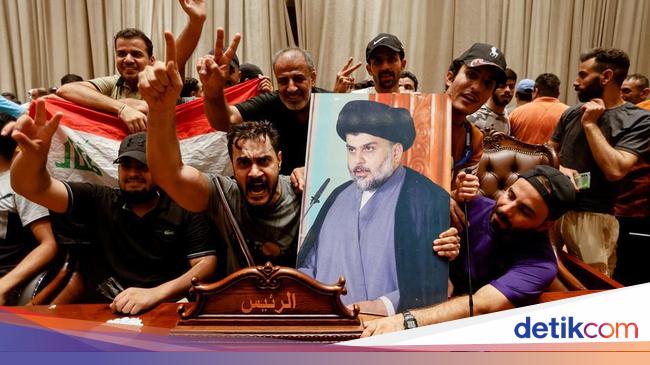Jakarta –
Nearly ten months after the legislative elections, Iraq still does not have a new government. The deadlock in Baghdad was sparked by the breakdown of negotiations and the mass resignation of the al-Sadr bloc, the largest faction in parliament.
Despite the temperature that reached 47 degrees Celsius and tear gas fire from security forces, pro-Sadr demonstrators were still determined to break through the “Green Zone” and stormed the parliament building, Saturday (30/7). The Ministry of Health reported that 100 demonstrators and 25 security personnel were injured.
As of Sunday (31/7), the demonstrators were still entrenched in parliament, while volunteers set up a soup kitchen and distributed soup, boiled eggs, bread and water. “We hoped for the best, but got the worst,” said one demonstrator, Abdel Wahab al-Jaafari, 45, of the post-election political turmoil.
ADVERTISEMENT
SCROLL TO RESUME CONTENT
–
“Politicians who are now sitting in parliament have never done anything for us,” he said.
In Iraq’s multi-factional electoral system, the formation of a government must go through complicated negotiations involving almost all groups. The system was conceived after the 2003 US invasion that toppled former dictator Saddam Hussein.
Last Sunday, Sadr wrote via Twitter voicing support for a “spontaneous revolution in the Green Zone – a first step towards fundamental change.” He called on “everyone to support the revolutionary reformers.”
The chaos in Baghdad was sparked by the decision of the pro-Iran alliance, the Coordination Framework, to nominate the former Minister of Human Rights, Mohammed Shia al-Sudani, as prime minister. The figure of the Islamic Da’wah Party is seen as the right-hand man of former Prime Minister Nuri al-Maliki, who was at odds with Sadr.
Internal split
The political bloc formed by al-Sadr was actually elected as the strongest faction in the Iraqi parliament following the results of the 2021 elections, although it failed to form a majority coalition. In June, 73 members of Sadr’s faction resigned from parliament in an effort to end the political deadlock.
The mass withdrawal leaves the pro-Iran bloc as the biggest force. That is why they took the initiative to nominate the prime minister without an opposition consensus. On that basis, al-Sadr sympathizers had occupied parliament for several hours on Wednesday (27/7) last week, before being asked to disband by the great leader.
Despite soaring oil prices, the Iraqi economy is reluctant to accelerate following rampant corruption and weak law enforcement. This situation triggered youth demonstrations that paralyzed the entire country in 2019.
Ironically, allegations of corruption were also directed at a number of Sadr’s followers who were given important positions in a number of ministries. However, for his supporters, Moqtada Sadr is still seen as an anti-corruption warrior and defender of the weak.
Similar enthusiasm has dominated the audience that has occupied parliament since last Saturday. One of them, Oum Hussein, 42, said he wanted to force the formation of a “pro-people government with integrity and a strong desire to serve the country.” He criticized political parties in Baghdad for always nominating politicians “known to be corrupt.”
Tensions in Baghdad fueled European Union concerns about “continued protests and potential escalation of conflict” between Iraq’s factions. The Secretary-General of the United Nations, Antonio Guterres, called on all parties to resolve differences through “peaceful and inclusive dialogue.”
The autonomous Kurdistan government has also offered the capital Erbil as a neutral area for the two sides to negotiate.
rzn/hp (ap,rtr)
Watch Video: Hundreds of Protesters Again Attack Iraq’s Parliament Building
(it/it)
–


